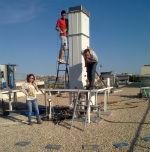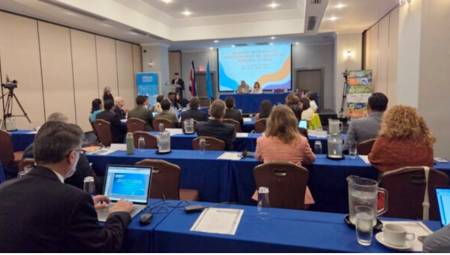 Spain. The doctoral thesis "Experimental characterization and modelling of the binomial distribution system-droplet separator in cooling towers", by Professor Javier Ruiz Ramírez of the Department of Mechanical Engineering and Energy of the Miguel Hernández University (UMH) of Elche proposes the improvement of the designs of the distribution systems-droplet separator to improve the energy efficiency of these facilities and avoid cases of legionella.
Spain. The doctoral thesis "Experimental characterization and modelling of the binomial distribution system-droplet separator in cooling towers", by Professor Javier Ruiz Ramírez of the Department of Mechanical Engineering and Energy of the Miguel Hernández University (UMH) of Elche proposes the improvement of the designs of the distribution systems-droplet separator to improve the energy efficiency of these facilities and avoid cases of legionella.
The thesis, which has been read at the Polytechnic University of Cartagena (UPCT), is directed by Manuel Lucas Miralles and Antonio Sánchez Kaiser. The emissions of droplets produced by cooling towers, recalls the thesis, can generate the breeding ground conducive to the appearance of bacteria, such as legionella, of risk to human health. "The tests carried out have made it possible to validate a model that can be of help in the location of a source of legionella contagion or simply for the evaluation of the environmental impact of a tower," explains the UMH professor.
The research, which is part of the doctoral program of the Department of Thermal and Fluid Engineering of the UPCT and which had the help of the Ministry of Science and Innovation, has developed a computer application to detect, through a hydrosensitive paper, the amount of droplets emitted by an experimental cooling tower, next to which a weather station and a pressure measurement tunnel were used to take into account all atmospheric variables.
The data collected for the thesis have allowed to establish that a change in the distribution system-separator of drops affects up to 82% of the volume of droplets emitted and that the energy efficiency of the cooling towers can be improved by 20% and that the water outlet temperature can be reduced by one degree.
"Cooling towers aim to dissipate the thermal load generated. In large installations this is usually done with a cooling tower, whose function is to collect the hot water that comes from the process and that carries the heat from it, and cool that water. The colder we take out the water, the more efficient the cooling process will be," explains UPCT professor Antonio Sánchez Kaiser.
Professor Javier Ruiz Ramírez is already working on a new research project between the UMH and the UPCT to integrate renewable energies into conventional processes of power generation and heat evacuation.
With information from Communication Office - Miguel Hernández Elche University.













